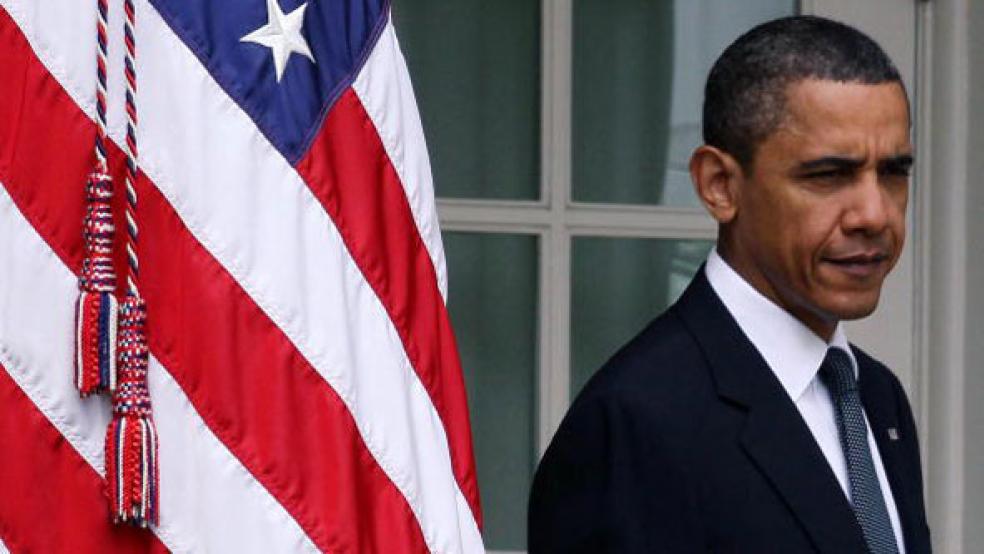Last week’s disappointing May jobs report is likely to renew criticism of President Obama’s $787 billion stimulus package as ineffective. The report said that while more jobs were added overall in May than any other month in the past decade, almost 90 percent were temporary government census workers, not new hires at private companies.
The massive stimulus spending package, signed into law by Obama in February 2009, has become a political punching bag for Republicans and even some Democrats. Senate minority leader Mitch McConnell, R-Ky., quipped earlier this year on Fox News Sunday, "The evidence is clear, Tiger Woods and John Edwards had a better year [in 2009] than the stimulus probably did."
The nonpartisan Congressional Budget Office hasn't analyzed the scandals that plagued the golfer and the politician, but it did report late last month that, contrary to all the criticism, Obama's stimulus package raised employment and boosted economic growth significantly.
After the first three months of 2010, the stimulus package — the American Recovery and Reinvestment Act — had kept some jobs from being eliminated and added enough new ones to lift the total number of people at work by between 1.2 million and 2.8 million compared to what it would have been without the stimulus.. Moreover, because some in the labor force working part time worked more hours, or got full-time jobs or worked overtime, the stimulus increased the number of full-time equivalent jobs by between 1.8 million and 4.1 million, CBO said.
Also, CBO estimated that inflation-adjusted gross domestic product — a measure of the nation's total production of goods and services — was 1.7 percent to 4.2 percent higher in the first quarter than it would have been without the stimulus. That indicates production was running at an annual rate of approximately $250 billion to $590 billion higher because of the stimulus.
Some economists have rejected the proposition that government spending can stimulate economic activity on the grounds that if the government borrows the money to spend, that borrowing would "crowd out" an offsetting amount of private sector spending or investment. However, when overnight interest rates are effectively at zero, crowding out simply is not an issue.
McConnell's claim in February that the stimulus didn't work — a claim he hasn't changed — was based on the unemployment rate hitting 10 percent late last year while the administration had originally predicted the package would cap joblessness at 8 percent during 2009. The jobless rate was 9.7 percent last month.
According to the CBO analysis, without the stimulus, the unemployment rate would not have been 9.7 percent in the first part of this year but between about 10.3 percent and 11.2 percent.
McConnell and his GOP colleagues understand all this perfectly well. They just don't want the public, in this election year, to credit Obama and Democrats with having pushed through a set of policies that made the awful recession inherited from the administration of President George W. Bush less painful than it otherwise would have been.
Instead, they — along with more than a few Democrats who are worried about the fall elections — are now harping on the dangers of the national debt. Yes, that's a potential danger. But with unemployment still not that much below 10 percent, it is too soon to shift gears.
Last week, just before a meeting of the finance ministers of the G-20 nations in Busan, Korea, Treasury Secretary Timothy Geithner sent his counterparts a letter making precisely that point. “We should reaffirm our commitment to safeguard the recovery and strengthen prospects for growth," Geithner wrote. "The G-20's strong policy response to the crisis has played a pivotal role in restoring economic growth, but concerns about growth as Europe makes needed policy adjustments threaten to undercut the momentum of the recovery."
In the wake of the violent financial market reaction to the Greek debt crisis, most eurozone governments have announced plans to reduce their current deficits. They've done so despite virtually stagnant growth, high unemployment and inflation of less than 0.4 percent. And the finance ministers didn't heed Geithner. Over the weekend the G-20 effectively dropped the group's previous support for fiscal stimulus.
The United States isn't in the bind Europe's in, and Congress ought not to act as if it is. Eventually both fiscal and monetary policy will have to begin to move away from stimulus, but not yet.
John M. Berry covered the Federal Reserve and the U.S. economy for the Washington Post for 25 years.
What do you think of this column? Let us know in the comments below.



